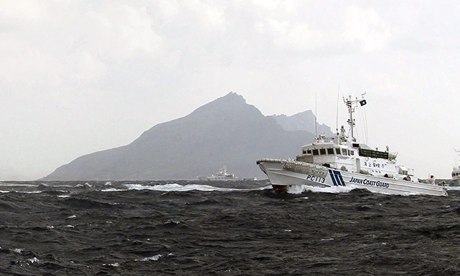China has tried to establish its authority over Japanese-controlled islands in the East China sea by demanding that all aircraft flying in the region obey its rules or face "emergency defensive measures".
The East China sea air defense identification zone came into effect from 10am local time on Saturday when the Chinese defence ministry issued a map of the area, which includes the uninhabited East China sea islands.
The ministry said all aircraft entering the zone must notify Chinese authorities and warned they would be subject to emergency military measures if they did not identify themselves or obey orders.
It said it would "identify, monitor, control and react to" any air threats or unidentified flying objects coming from the sea.
"China's armed forces will adopt defensive emergency measures to respond to aircraft that do not cooperate in the identification or refuse to follow the instructions," it added.
Any military dispute between China and Japan over the islands would involve the United States because of the terms of the second world war settlement with Japan.
Both China and Japan claim the island, which the Japanese call the Senkakus and the Chinese call the Daioyu.
"This is a necessary measure taken by China in exercising its self-defence right," a Chinese defence ministry spokesman said in a statement. "It is not directed against any specific country or target. It does not affect the freedom of overflight in the related airspace."
But Narushige Michishita, director of the security and international studies programme at the National Graduate Institute for Policy Studies in Tokyo, said: "China is playing a dangerous game here. It is certainly an escalatory action and might prolong and exacerbate the ongoing tension."
Patrol ships from both countries have been shadowing each other near the islets, raising fears that a confrontation could develop into a clash.
There have also been several incidents involving military aircraft flying close to each other. In October, Chinese military aircraft flew near Japan three days in a row, and Japan scrambled fighter jets each time in response.
Protests erupted throughout China last year to denounce the Japanese government's purchase of the islands from private ownership.
In recent years, China has been embroiled in rows with several neighbouring countries including the Philippines and Vietnam over islands in the East and the South China seas. South Korea and Taiwan also claim the Senkaku islands.
Original Article
Source: theguardian.com
Author: Staff and agencies
The East China sea air defense identification zone came into effect from 10am local time on Saturday when the Chinese defence ministry issued a map of the area, which includes the uninhabited East China sea islands.
The ministry said all aircraft entering the zone must notify Chinese authorities and warned they would be subject to emergency military measures if they did not identify themselves or obey orders.
It said it would "identify, monitor, control and react to" any air threats or unidentified flying objects coming from the sea.
"China's armed forces will adopt defensive emergency measures to respond to aircraft that do not cooperate in the identification or refuse to follow the instructions," it added.
Any military dispute between China and Japan over the islands would involve the United States because of the terms of the second world war settlement with Japan.
Both China and Japan claim the island, which the Japanese call the Senkakus and the Chinese call the Daioyu.
"This is a necessary measure taken by China in exercising its self-defence right," a Chinese defence ministry spokesman said in a statement. "It is not directed against any specific country or target. It does not affect the freedom of overflight in the related airspace."
But Narushige Michishita, director of the security and international studies programme at the National Graduate Institute for Policy Studies in Tokyo, said: "China is playing a dangerous game here. It is certainly an escalatory action and might prolong and exacerbate the ongoing tension."
Patrol ships from both countries have been shadowing each other near the islets, raising fears that a confrontation could develop into a clash.
There have also been several incidents involving military aircraft flying close to each other. In October, Chinese military aircraft flew near Japan three days in a row, and Japan scrambled fighter jets each time in response.
Protests erupted throughout China last year to denounce the Japanese government's purchase of the islands from private ownership.
In recent years, China has been embroiled in rows with several neighbouring countries including the Philippines and Vietnam over islands in the East and the South China seas. South Korea and Taiwan also claim the Senkaku islands.
Source: theguardian.com
Author: Staff and agencies

No comments:
Post a Comment